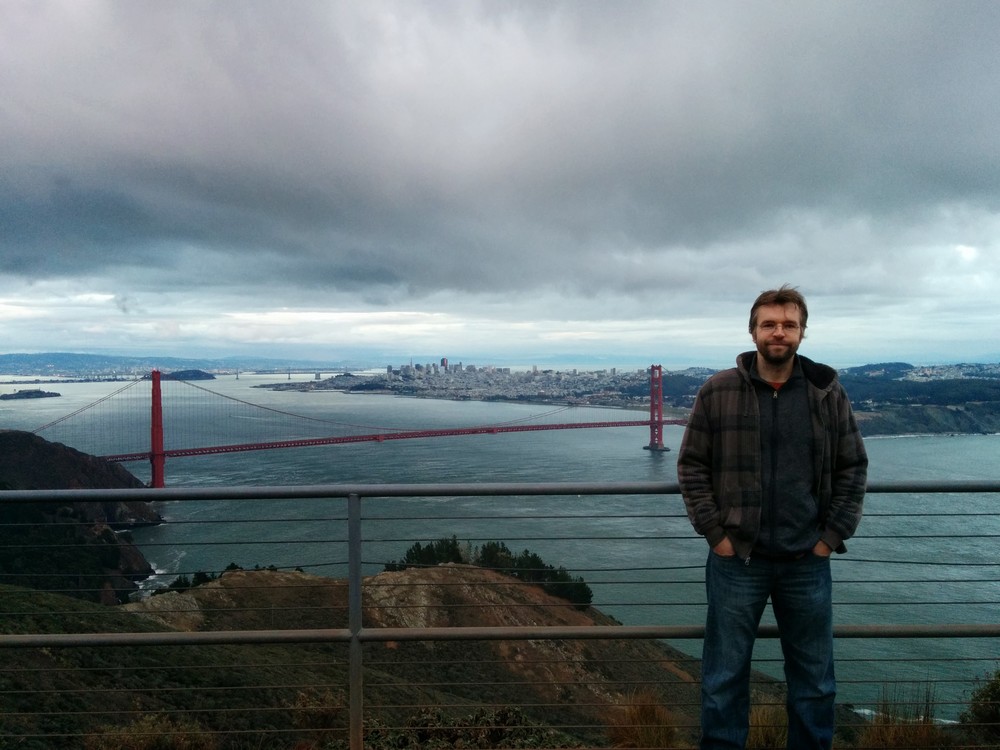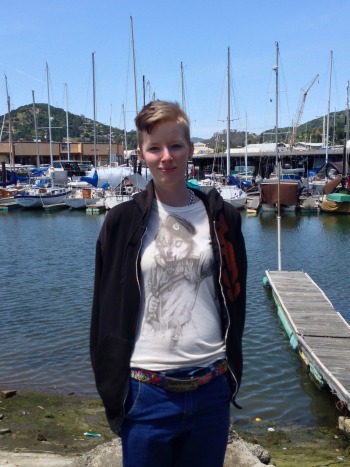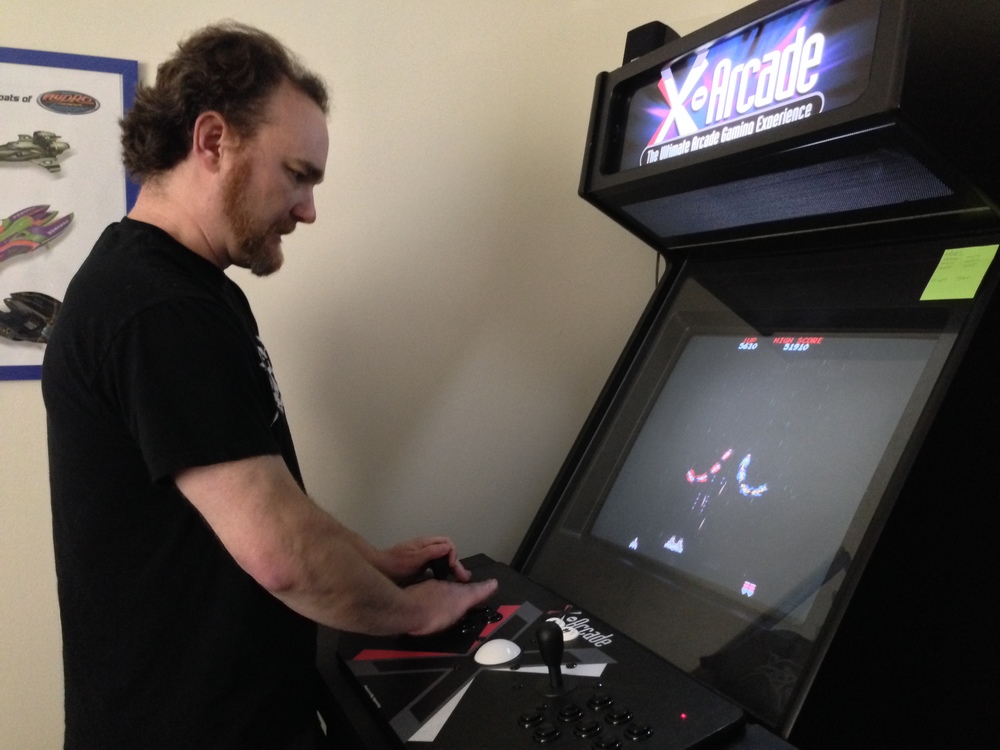As of January 2020, Richard is Vector Unit’s newest hire, bringing our total company staff count to a whopping … 6!
Things You Should Know About Ian Phipps, Game Designer
Things You Should Know about Matt Small – Co-Founder and Creative Director
When you talk to Matt, you can almost sense that the Beach Buggy franchise (Beach Buggy Blitz and Beach Buggy Racing) was meant to be. After all, he’s lived his whole life in California, loved beach buggy television shows (like Speed Buggy and Wonderbug) growing up, and had a hobby of building intricate plastic models of classic American muscle cars.
While you may have read Co-Founder Ralf Knoesel’s team profile, it’s interesting to hear another side of the Vector Unit co-founding story. (And because you get different answers when you ask different questions.) While maintaining day jobs (and girlfriends and social lives), Matt and Ralf had been working on a boat combat game in their spare time, but weren’t making much progress. Matt agrees that the Vector Unit timing was right as a “now or never” moment. Both had some money saved up, neither had hardcore financial obligations, and both were optimistic about the risk. After all, they could try out the start-up for 6-12 months, and if things didn’t work out, they could probably go back to regular jobs in the games industry, right?
So Vector Unit came to be on January 29, 2008. Matt and Ralf worked out of Ralf’s house for a while, then found super cheap, super tiny office – room for only two desks and a printer. Code-named “Barracuda” at the time, their boat-racing demo (which later became Hydro Thunder Hurricane) was finished that July. Ralf and Matt started shopping it around to publishers. Several were seriously interested and they were in the midst of negotiating terms.
But then in September 2008, the economy collapsed. Publishers started pulling out of deals altogether. Matt and Ralf were soon down to the last of their savings, and job prospects in the game industry were looking pretty bleak.
In the end, Vector Unit signed a deal with Microsoft for Hydro Thunder Hurricane, and they didn’t starve. But that experience contributes significantly to how the company approaches partnerships today. Matt and Ralf would rather hedge their bets on the uncertainty – and potential reward – of self publishing rather than depend on a publisher for financial viability.
“We learned a core lesson and central truth to negotiating in business,” Matt says. “If you’re negotiating from a place of strength, that’s obviously the best place to negotiate from. You lay out what you want, and if the other party can’t match that, you need to be able to just walk away.”
Matt has no formal business training, and while he originally thought that running the business was going to be a necessary evil in a way, it’s actually been part of the job that he really enjoys. Reading contracts is a bit boring, he admits, but he likes strategically deciding on game platforms, choosing which partners to work with, and getting to do a bit of everything including game development, creative direction, art, voice acting, and sound design. (As co-founders, Matt takes care of legal matters and Ralf takes care of financial matters. They share business operation responsibilities.)
Maybe Matt was meant to be a dabbler. After all, his career path certainly lends itself to being a Jack-of-all-trades. After majoring in English Literature at UC Berkeley, Matt got into desktop publishing, laying out advertisements for local businesses. The job was right next to Berkeley Systems, then popular for making famous screensavers. Armed with his art skills and limited programming knowledge from college classes, Matt “faked his way” in with an animation portfolio and says, “They were nice enough to give me a job.” Learning 2D and 3D animation in his spare time and on the job, this is where he got his original game and management training. In addition to screensavers, Berkeley Systems developed games (including the You Don’t Know Jack! franchise). Matt was responsible for writing proposals for games, negotiating deals for new projects, and through this, eventually worked his way up to creative direction and management.
English degrees can be put to good use, kids: “In game development, there’s actually a lot of creative work that calls for you to express ideas clearly. Being able to write descriptively and use correct grammar and punctuate sentences is always useful,” says Matt. Matt went on to work at Stormfront Studios, then Electronic Arts before going indie with Vector Unit.
In terms of career advice, Matt encourages people to identify what it is that they enjoy and really go after it, taking chances in advocating for themselves. “It sounds obvious, but sometimes people are so grateful to have a job in the games industry, and then get pigeonholed into something they don’t really like.” With Vector Unit being such a small team at the moment, there’s a lot for each person to do, but Matt plans to maintain the mindset he experienced at Stormfront. Managers were encouraging and supportive of motivated employees who wanted to try new roles, and it’s where he was able to go from artist to art lead, a managerial role with a bit of design bent. “Most of the things I’m happy with in my career are the things I got because I reached out beyond the job I was doing, and then proving I could do it. That’s really important for any job you’re in.”
If you want to find out even more about Matt, check out this interview from November 2013 at Teck Comes First or just ask in the comments below (which you can do for any of our team members too!).
Matt at E3 2014
Things You Should Know About Ralf Knoesel – Co-Founder and CTO
Did you know that if he had not gone into game development, Ralf could have been on track to become an astronaut?
As a kid growing up in Germany, Ralf had always been fascinated with flight. His interests included remote-control airplanes, flight simulators, rockets, and “space stuff.” He even went to school for Aerospace Engineering. On track to become a programmer with something to do with aerospace, Ralf explored several career options. But luckily for us, Ralf discovered computer graphics, specifically 3D graphics engines.
With game development and computer programming as two of his passions, Ralf saw a posting for a 3D graphics programmer in the Bay Area. He loved the idea of getting paid for having fun, and so started his career in games. That company was Stormfront Studios (which closed in 2008), and Ralf was there for 12 and a half years until he took the plunge to co-found Vector Unit with Co-founder and Creative Director Matt Small. “We thought if we were ever going to do it, that was the time. Neither of us had kids, we had money saved up, and it seemed like a huge risk but the timing was right.”
When asked what made him stay for so long at Stormfront, Ralf immediately says, “Co-workers, period. I don’t know how they did it, but Stormfront had a knack for hiring really good people. That’s what’s really important for a functional and productive company. You need talented people who can get along.” And it says something for the team that three ex-Stormfront employees are now part of Vector Unit. Today, Ralf is able to combine aspects of his extensive work history into shaping how he wants to co-run the business. Working with a small team allows him the freedom to work with people he likes, do what he wants to do work-wise so it’s never boring, and have more control over his own fate. With so few people, the Vector Unit team benefits from profit-sharing, so everyone can partake in the success of their hard work – something rarely seen at large studios.
While he admits to a certain discomfort at the volatility of the market, being a little at the mercy of app stores, and crossing fingers for getting featured, it’s an experience he wouldn’t trade for anything. “When we talk to partners or publishers, we get to say ‘no’ a lot, because we don’t need anything. We don’t have to chase the next contract from some publisher – and that’s everything. That’s the best.” In a way, that’s how Shine Runner came to be. After finishing Riptide GP, Ralf and Matt had a terrible time pitching games to publishers, because “nothing stuck.” They then decided to make their own game, have fun, and self-publish. Shine Runner turned out to be profitable, and a much better use of their time.
As for advice, Ralf says, “If you’re thinking about doing a start-up, it’s about ten times as hard as you think, but the rewards are ten times what you envision. The potential is there if you make it.”
 Ralf Knoesel, Co-Founder and CTO
Ralf Knoesel, Co-Founder and CTO
Things You Should Know About Timm Sewell – Artist Extraordinaire
Despite what she says about “not being that interesting” and remaining mysteriously tight-lipped about her nickname, Timm is an easy conversationalist and quite the adventurer. One might guess at Tim Burton being one of her inspirations both for name and art style, but while the second part is true… yeah, that’s not right either.
Originally from Virginia, Timm grew up in Maryland, went to school in Florida, and twice in her life now, has moved halfway across the country with little more than high hopes. She’s also proof that cold emailing a link to your portfolio can work when job hunting because that’s basically the story of how she came to work at Vector Unit.
Timm was in Austin, Texas when she started doing freelance contract work for VU. That turned into a 6-month in-office contract, then a full-time job. Beach Buggy Blitz feels a lot like “her baby” because it was the first project she really worked on. Timm loves that it reflects her art style and takes pride in having conceptualized so much of it. As an artist with such a small team, she enjoys the immense creative freedom she gets, as well as being able to wear so many different (job) hats, that she never gets bored. While modelling and texturing are her favorite parts of the job, she loves being able to see assets go all the way from concept to in-game animation. There’s also a great level of communication with this awesome team.
As a kid, Timm grew up playing games like Star Fox, Mario, The Legend of Zelda, Pokémon Stadium, and Super Smash Bros. with her older brother, taking turns when necessary. She attributes her love for video games to him (who got her into video games in the first place), and who is mainly the reason why she enjoys multiplayer gaming and being part of a community. Her favorite games include the Metal Gear Solid series, Left 4 Dead, and Mario Kart 64. But her absolute favorite arcade game is the classic Sunset Riders. If you find it in an arcade, please let her know since there are only two she knows of in the Bay Area. Also, she heavily supports the idea of a Pokémon MMO.
Aside from video games, Timm has an extensive list of hobbies like watercolor and gouache painting, cartooning, sculpting (can you tell she’s an artist?), sewing, hiking, and playing with her dog (she loves animals in general). She also loves cooking and would do it more if it weren’t for her currently tiny (and poorly laid out from the sounds of it) kitchen. That’s okay, she’s moving soon.
In terms of advice for future game developer artists, she says, “Keep learning; don’t stop doing what you love; and keep practicing, even if you can’t find a job. Or at least stop moping.”

Things You Should Know About Steve Mariotti, Senior Programmer
Vector Unit Senior Programmer Steve Mariotti is a man of few words, but his professional history speaks volumes about his illustrious career in game development. He started writing games while in college at the University of Texas at Austin, and says, “Game development found me. There was never any question that I was going to do anything else after I was about 20.” He’s a bit sheepish now about the Shareware Sinistar clone he’d written back then, but it got him his first gig.
Fast forward, and after shipping over fifteen games later, Steve has held titles such as Technical Director and Lead Programmer at companies like KIXEYE, Nihilistic Software, Stormfront (where he originally met VU founders Ralf and Matt), Activision, and Atomic Games.
As a programmer, the best part about the job for Steve is the variety in working on new and interesting things, and not knowing what’s coming next (in a good way). At Vector Unit, he enjoys working with an awesome (and incredibly efficient) team. He also finds it refreshing to be at an indie developer that can be completely autonomous (without publishers, investors, etc.) so the quality of the games is never sacrificed for a schedule or crazy marketing initiative. He laments one time (at another company that shall not be named) when someone told him that the entire interface was the “wrong shade of green” … three weeks before shipping. It took him three solid days of working around-the-clock to redraw every bitmap. There’s none of that at Vector Unit!
Professional life aside, Steve is a funny guy who will undoubtedly give us funny stuff for our Twitter feed as time goes by. He’s a self-proclaimed nice guy, father to two girls (aged 15 and 12), loves heavy metal, and plays guitar. When asked about his band, he says, “Yeah … it’s not really a band. It’s a concept band called Please Leave. It’s a band that you hire when you want people to leave your party. We only know three songs, and they’re really bad.”
His advice to young aspiring game developers, especially programmers, is to dive in and just make games. “If you’re a programmer, always just program. If you want to make games, write your own little ones, download other people’s source code and experiment with it, get involved with the mod community, and read Gamasutra. For AI programmers, check out AIgamedev.com run by Alex Champandard.”
When pressed for Easter eggs in Riptide GP2, he hints at one but will only say, “It’s more literal than most Easter eggs.”
 Steve Mariotti
Steve Mariotti




